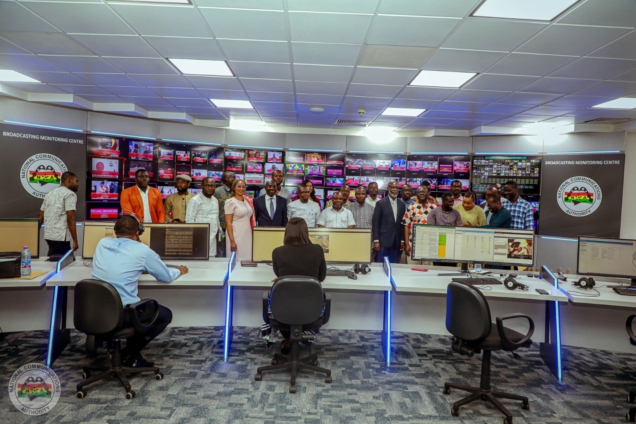Some of the major challenges faced by electromagnetic spectrum users and managers in many parts of the world are the growing demands for frequency allocation, cases of interference, and quality of transmission signals.
Electronic communication in Ghana has evolved over the years with the industry showing commitment towards improving service delivery with the latest technologies.
For example, the analogue radio experience in Ghana grew from the mounting of tall directional antennas on Radio Receivers to the use of portable and mobile receivers which use only some simple whip antennas for reception.
However, factors such as the blocking of signals by tall structures or hills that lie on the signal ways and the fluctuation of signal strengths of radios in moving vehicles continue to affect the quality of radio broadcasts in the country. Also, the desire of Broadcasters to reach out to larger audiences and the zeal to own more broadcasting channels have resulted in mutual interference among transmissions with a resultant poor quality of the audio being broadcast.
National Communications Authority introduced the use of Cavity Filters by broadcasters to prevent interference and implemented the reclassification of broadcast radii to create room for additional allocations. That is yet to fully solve the challenges in the radio broadcast industry.
In recent times, the Analogue broadcast is faced with increasingly stiff competition from non-broadcast media that uses virtual tools to reach out to a larger audience at affordable costs, thus making it more attractive to businesses and consumers. Through a Facebook feed or a YouTube broadcast, a business can reach its target audience in every corner of the country and beyond, while the conventional analogue radio continues to oscillate within its transmission confines.
Advertisement is the lifeline of every broadcast business. Advertisers pay to have their commercials or promotional messages aired, reaching a wide audience. These advertising revenues, in turn, support the operational costs of the broadcast business, including content production, staff salaries, equipment, and other expenses.
The current challenges of the Analogue radio are taking a toll on the Radio Business in Ghana with most of them struggling to keep afloat in the turbulent market.
The introduction of Digital Radio by the telecom regulator in Ghana would let out a sigh of relief from many broadcasters and would improve the radio listening experience for most consumers.
The NCA on Tuesday, July 25, 2023, began piloting a Digital Radio Broadcast in two cities of Ghana; Greater Accra and Greater Kumasi.
The technology is termed Digital Audio Broadcasting. This trial positions Ghana as the first country in West Africa and the fourth in Africa to deploy DAB.
DAB has a significant advantage over the conventional Analogue Broadcast. Unlike conventional analogue broadcasting, the DAB system enables several sound programs to be multiplexed together and broadcast on the same radio-frequency channel. In this ongoing trial, 18 existing FM stations in Accra and Kumasi will share the same frequency channel to deliver DAB services.
DAB gives high-quality audio broadcasts using digital signals without interference. DAB would have a wider reach and improve signal reception.
As announced by the NCA, Ghana would roll out DAB+ which is a higher version of the DAB technology. This would be a huge step towards an interactive radio experience for both broadcasters and consumers.
The experience is expected to be interactive where broadcasters are able to send services in texts and images while consumers can search DAB Stations by their names instead of the old ways of memorizing the figures of their frequencies.
Consumers would be spoiled for choice as they would switch between channels conveniently to enjoy their favourite programmes on the radio without boundary limitations, interference, or signal loss.
We welcome the news of the implementation of this technology, and it is our expectation that the industry explores all opportunities it would bring to improve service delivery and resuscitate the struggling radio business.
-
The Writer is a Communications Specialist. All views expressed in this article are my personal views and do not represent those of any organization (s). email; kingnobert2@gmail.com. Mob:+233241145874.
Latest Stories
-
Today’s Front pages : Friday, July 25, 2025
28 minutes -
NPP govt was living ‘champagne lifestyle on Akepeteshie budget’ – Finance Minister Ato Forson rebukes
58 minutes -
Rwanda’s Kagame appoints central banker as new prime minister
1 hour -
Mahama running an optics and settings government – Sammi Awuku
1 hour -
Parliament approves bill to scrap marine gas oil subsidy
1 hour -
Discipline, not rhetoric stabilised the cedi – Ato Forson jabs Bawumia
1 hour -
Parliament’s Appointments Committee to vet final Deputy Minister nominees today
1 hour -
Hospital worker arrested over assault of patient
2 hours -
Starmer urged by MPs to recognise Palestinian state
2 hours -
Streeting vows to keep NHS services running as doctor strike begins
2 hours -
You had 8 years, why didn’t you fix it? – Ato Forson questions Bawumia’s legacy
3 hours -
I won’t boast like Bawumia – Ato Forson distances himself from cedi ‘arrest’ politics
3 hours -
No gold changed hands – Ato Forson shreds NPP’s Gold-for-Oil policy
4 hours -
Gold-for-Oil was a sham, BoG just paid in dollars, says Ato Forson
4 hours -
No such warning from IMF – Ato Forson rebuts NPP’s claim on BoG interventions for cedi stability
5 hours

